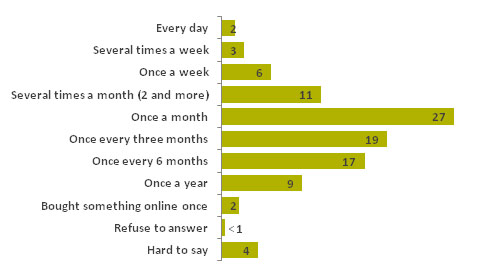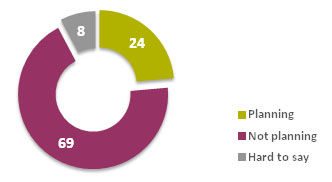Judging by frequency of online purchases in Russia, consumers got used to shopping online, online and offline shopping became complimentary to one another. According to the results of our research, 44% of Russians shop online, of which 6% buy food products online. Despite the skeptical approach of the consumers to buying food online, we can talk about “gradual adaptation” to it. What do Russians think about the perspectives of development of this part of online shopping?
Why is Internet not an option?
For those Russians who reject shopping online, the main reasons to do so are the lack of possibility to see the product with their own eyes, try it (in case of clothing) and a general lack of trust in online services. The first reason is applicable both for younger and for older people. For people living in cities with population of 250 thousand to 1 million people the lack of technical capabilities or skills of using online services become extra barriers to online shopping.
As for the main reason for not buying food products online, except for the ones mentioned before, respondents mentioned “the existence of shops that you can reach on foot (convenience stores)” where shopping for food is more usual , easier, faster.
Am I in the target group?
Online shoppers are usually young or middle-aged people whose monthly income per member of household is more than 25000 roubles. As for frequency of online purchases, 48% of online shoppers make purchases online more than once a month (see Image 1).
Image 1. Frequency of online purchases, % of respondents who shop online

We also should mention citizens of Saint Petersburg: they are more likely to shop online than people living in other Russian cities. Also, the share of online shoppers in Saint Petersburg grew by 15 percentage points during the last five years reaching 61% (see Image 2).
Image 2. Share of online shoppers, % of respondents

Where and What do they buy?
The most popular websites for online shopping are Aliexpress (23% online shoppers), Ulmart, Ozon.ru, Lamoda (6% each)**.
The most popular product categories for online shopping are closthes (46% online shoppers), home appliances (40%), airplane and railroad tickets (31%) and electronics (28%). Clothes are most likely to be bought online by women and by people who are 18-24 years old; home appliances are most likely to be bought by people who are 25-34 years old; electronics is most likely to be bought by men and by people who are 35-44 years old. 6% of online shoppers buy food products online.
What next?
As for the future, 24% of online shoppers plan to buy food products online in the future (see Image 3)
Image 3. Plans to buy food products online, % of online shoppers.

According to respondents, in the next several years there will be major growth in e-commerce related to food. Even those respondents who are not ready to buy food online or those who are ready to do it but do not have enough experience in online shopping are confident that this type of e-commerce has potential. Here it would be useful to focus our attention on the audience who are familiar and comfortable with modern technology.
“In our country this sphere of business is, doubtlessly, growing, we will see an increase in sales volumes. There are many advantages such as speed of service and product range. If the delivery is fast and convenient, it would be a better alternative to traditional shops. This concerns mostly young people and middle-aged people. I do not take older people into account here as not every one of them is able to use the Internet, and there is a habit to go to the store, which is unchangeable, develop throughout their whole lives.” (Yelena, 41 y.o., St. Petersburg)
“The NEXT generation, those children who grew up with Iphones, will purchase products in the Internet. The 90-s generation and older people are not ready for it as not everyone is ready to risk, to make the first order. It is easier to go and buy everything offline. It [online shopping] appears “wild” for grown-up people.” (Sergey, 26, St.Petersburg)
E-commerce is showing impressive growth in various market segments. Buying food products online, however, is subject to exceptional mistrust: 41% of respondents completely do not trust this type of shopping. At the same time, this research demonstrates that respondents in larger cities are open and ready to buy food on official web pages of offline shops that they are used to. This option appears to be interesting for consumers if the prices, product range and product storage conditions are similar.
It is very important to mention that the idea of switching to new purchasing strategies exists in consumers’ mind. It is to be discovered what can be done to take this idea into reality.
You can get more detailed information on this topic from our “Analysis of E-commerce in Russia – March-June 2016” report.
*This research was conducted among people living in Russian cities with population of 100+ thousand people, age 18-64, who are responsible for making the majority of decisions on buying food products in their household (fully or equally to other household members). The survey took place in 52 cities in Russia, with divisions by city size, federal district and age-gender grouping. Method used: telephone interviews. A total of 1022 people were interviews, of which 453 people shop online.
The second wave of research was a qualitative study on Russians’ attitude to buying food products online in August 2016. This research project included 28 in-depth telephone interviews. Respondents were selected from men and women, 18-56 years old, living in cities with population of 100+ thousand people, who were responsible for buying food products in their household and had experience in buying food products online.
** The list of e-commerce websites was not read out









